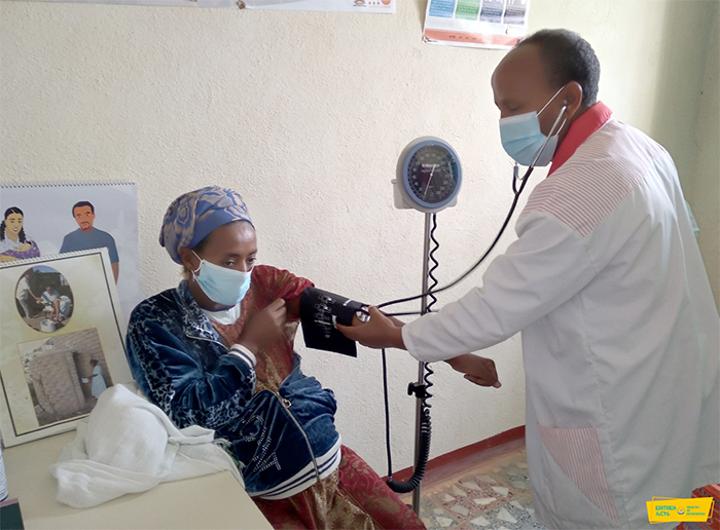Africa-Press – Eritrea. The Eritrean government has been doing commendable work to improve the health of mothers and children by building health stations, health centers, and referral hospitals.
Health stations and clinics are the most basic health service providers, where pregnant women make their regular checkups. Regular follow-up is important during pregnancy, and taking this into consideration, the Ministry of Health (MoH) initiated a plan to put preconception care under the department of reproductive and maternal health.
Preconception care is the provision of biomedical, behavioral, and social health interventions to women and couples before conception occurs. It aims at improving their health status and reducing
harmful behaviors and individual and environmental factors that contribute to poor maternal and child health outcomes. Although opportunities to prevent and control maternal and childhood diseases occur at multiple stages of life, preconception care helps strengthen public health programs that use a life-course perspective from infancy through childhood and adolescence to adulthood. Normally, babies born at either low or high birth weights are at risk for lifelong chronic diseases and obesity. However, babies born to women who experience preconception health care should be less likely to be premature and have low or high birth weight, a birth defect, or other disabling condition.
Even if preconception care aims primarily to improve maternal and child health, it also brings health benefits to adolescents, women, and men, irrespective of their plans to become parents. Preconception care focuses more on how to communicate with mothers or women, who are ready to conceive, on how to take care of their health and the health of their children. It emphasizes early counseling, screening, and treatment and is all about opening the way to a healthy and responsible society.
According to the World Health Organization (WHO), it is believed that preconception care will bring a huge change in improving the health of mothers, especially in developing countries like Eritrea.
Preconception care is advantageous because it reduces maternal and child mortality, prevents unintended pregnancies and complications during pregnancy and delivery; prevents stillbirths, preterm birth, and low birth weight; prevents birth defects and neonatal infections; prevents underweight and stunting; prevents vertical transmission of HIV/STIs (Sexually transmitted diseases), and lowers the risk of type 2 diabetes and cardiovascular disease later in life.
Some of the important areas addressed by the preconception care package are nutritional conditions, vaccine-preventable diseases, Female Genital Mutilation (FGM), sexually transmitted infections, mental health, tobacco use, and prevention of adverse perinatal outcomes.
Nutritional conditions:
Adolescent girls who are planning to get married should be informed, educated, and counseled about marriage. They need to take iron and folic supplement before conception. Their nutritional status should be monitored and screened for anemia and diabetes, and energy-rich dense foods should be provided to them. Early management of any identified deficiencies should be corrected before getting conceived. Intake of iodized salt and regular exercise should be practiced during adolescence to give birth to a healthy child.
Vaccine-preventable diseases:
Most of the diseases that occur in newborns could be prevented by vaccinating the mother before or during pregnancy. Couples could be vaccinated against tetanus, diphtheria, rubella, and hepatitis to prevent prenatal infection which could lead to mortality and morbidity of patients. The MoH is ready to give in 2022 HPV vaccine, which prevents ovarian cancer, to girls between the ages of 9 and 14.
Female genital mutilation:
Girls should discuss with their parents and/or partners and discourage the harmful practice. Screening women and girls for FGM to prevent complications during labor is advisable. If the women experienced FGM, advice could be given to choosing safe ways of managing the condition and how to access treatment. In Eritrea, FGM prevalence has been consistently declining for the last twenty-five years. FGM of under 15 years old decreased from 33.2% in 2010 to 3% in 2018 and FGM of under 5years old decreased from 12% in 2010 to 1% in 2018.
In 2018, in an effort to tackle FGM and other violations of child rights, the MoH, Ministry of Labor and Social Welfare, and the National Union of Eritrean Women came together with UNICEF and UNFPA to form a National Steering Committee and a National Technical Committee to provide policy and technical guidance on FGM, underage marriage and other harmful practices. The National Steering Committee and National Technical Committee jointly strengthened community-based child protection systems at all levels by establishing and strengthening Child and Women Rights Committees in all six regions, 67 sub-zones, and 701 administrative areas. This time the plan is to totally eradicate FGM by 2025.
Sexually transmitted infections:
It is crucial to provide age-appropriate comprehensive sexuality education and services. Promoting safe sex practices through individual, group and community-level behavioral interventions would help in minimizing STIs, including HIV.
Mental health:
Assessing psychosocial problems, the provision of educational and psychosocial counseling, treating and managing depression in women who are planning to be pregnant and other women of childbearing age contributes a lot to the child’s health outcomes. Strengthening community networks and promoting women’s empowerment by improving access to education for women and reducing economic insecurity of women of childbearing age helps them to remain emotionally stable.
Tobacco use:
Couples who are smokers or non-smokers should be advised about the harmful effects of second-hand smoking and the harmful effects of smoking on pregnant women and unborn children. Preterm birth, low birth weight, and other adverse perinatal outcomes associated with maternal smoking in pregnancy can be prevented if women stop smoking before or during early pregnancy
Prevention of adverse perinatal outcomes:
Folic acid and Iron supplementation should start at least 3 months before conception for optimal effect on reducing the risk for neural tube defects. Daily use of vitamin supplements containing folic acid has been demonstrated to reduce the occurrence of neural tube defects by two-thirds.
Women who are on a regimen of antiepileptic drugs or on any anticoagulants and who are contemplating pregnancy should get counseling from their physicians and be prescribed a lower dosage of these drugs or change the type of drugs. Diabetic mothers should control their glycemic measures before getting into pregnancy as there is a three-fold increase in the prevalence of birth defects among infants of women with uncontrolled type 1 and type 2 diabetes. Mothers who are taking levothyroxine for hypothyroidism should increase the dosage during early pregnancy.
Rubella vaccination, which was given to girls under 15 years old, provides protective immunity and prevents rubella infection during childhood and congenital rubella syndrome when they give birth to a child.
Sexually transmitted infections, such as Chlamydia trachomatis and Neisseria gonorrhea, have been strongly associated with ectopic pregnancy, infertility, and chronic pelvic pain. STIs during pregnancy might result in fetal death or substantial physical and developmental disabilities, including mental retardation and blindness. Early screening and treatment prevent these adverse outcomes.
The MoH believes that this problem can be alleviated by engaging communities in communication. Preconception care is one way to engage in communication and improve maternal and child health care.







